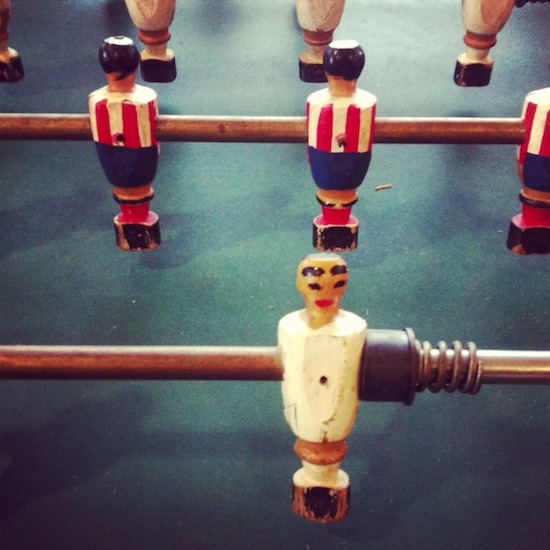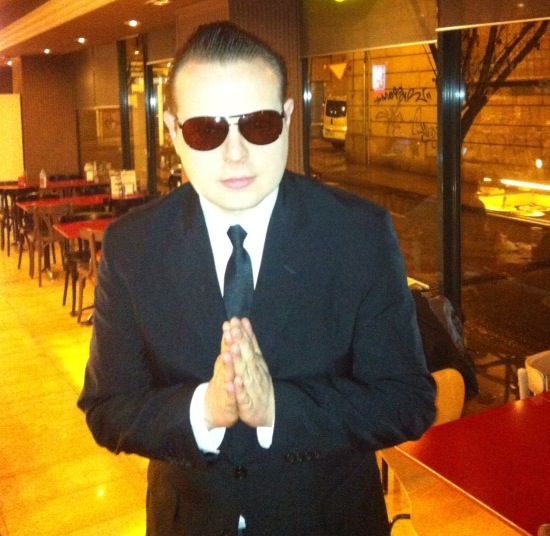19.01.13
I’m in Barcelona Airport waiting for Benjamin Schoos. I first met him at the same time last year when I was in Paris avoiding my birthday. We convened for an interview at L’Hotel Amour in Pigalle, chosen by the Belgian singer presumably because a) many bands pass through and do promo there like the less salubrious Columbia Hotel in London and b) one of the songs on his China Man vs China Girl LP is called ‘À Mort L’Amour’, or ‘Death To Love’. Even if you’re challenged by the French language as I am, you can probably see that’s a neat play on words. Being a Serge Gainsbourg obsessive, I enjoy a good jouer avec les mots, and in truth Benjamin’s CD might have gone in the bin had I not noticed the press release inscribed with the words “influenced by the orchestral flourishes of Jean Claude Vannier”. Schoos looks very serious on the cover, his hand tucked into his shirt, the implication being that he’s holding a gun (though he’s more likely squeezing his own moob).
I was relieved then to discover that he doesn’t take himself at all seriously. In fact he turns out to be a great raconteur with hilarious tales about soundtracking pornography, upsetting Morrissey (he witnessed Chrissie Hynde question The Pope Of Mope’s vegetarianism to his face because he doesn’t milk his own cow) and meeting Vladimir Putin at the Eurovision Song Contest in Russia in 2009. (The Russian leader donned a baseball cap and was slurping out of a can looking “well hip hop”.) Schoos helped write the entry ‘Copycat’ in the same year Sebastien Tellier entered Eurovision for France. ‘Copycat’ was destined for nil points but for a timely intervention by Azerbaijan, who awarded the song one solitary point near the end of voting. Apparently the singer of the song (not Schoos) got so drunk after the show that he attempted to get his cock out of his trousers in order to piss all over the bar at the aftershow (only he couldn’t get his zip open quickly enough and soiled himself in front of many of Europe’s leading dignitaries).
Benjamin returned to Brussels and me to London and unusually we kept in touch via the odd email. Then in the summer of 2012 he pulled off a coups d’état by getting his song ‘Je Ne Voir Que Vous’ – featuring Stereolab’s Laetitia Sadier – on BBC Radio 6 Music (on the A-list no less), an astonishing feat considering every one of its 203 words are French. Many other French speaking artists I’ve met react with despondency when the UK market is mentioned because most of them can’t get arrested. Benjamin too has no British equivalent, his deep voice parlez-ing over pianos and strings, then crooning in the old chanson variété tradition but subverting it with esoteric lyrics about a skinny wrestler getting his arse kicked by martial artists for love. He probably has more in common with France’s Sebastien Tellier than anyone else, but the comparison – as these things usually are – is superficial. The concept album China Man Vs China Girl blurs the boundaries between romance and comedy – a convention far more acceptable in film – and whether or not you like hilarity with your pathos is a matter of taste. Not that most English people have a clue what he’s going on about. Canny Schoos believes the only way to get noticed in the UK is to make that Gainsbourg influence overt “because the British media only seems to know about him”. He has a point.
Barcelona Airport is big. This will be my abiding memory of the city because once we’ve picked up the hire car we’re heading straight for Lleida, a town approximately 180km left of Barça on the map. There’ll be no ramble down La Rambla, no Park Güell where one can see the inside of Antonio Gaudí’s brain emerging from the herb. I notice a Hotel Goya as we traverse slowly into Lleida. Now that sounds inviting.
The show in Lleida is the most underwhelming of the tour. Everyone is shattered. Dominique A (who Benjamin is supporting) is in fine form to be fair, though he’s been touring Spain for the last week and a half already. After the show I get accosted by a drunk Spanish woman at the merchandise stand who blows in my face and tries to make me drink. After she physically assaults me I decide to head back to the hotel, but not before walking the streets searching for chocolate. I eventually find a shop open and fill a bag with churros. Benjamin turns in early too.
20.01.13
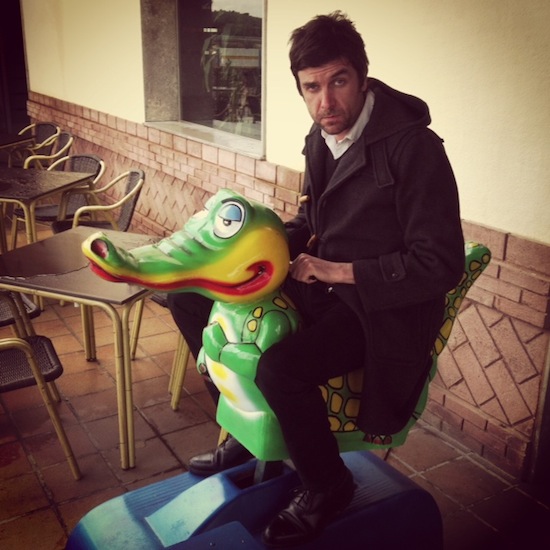
Yesterday’s drive from Barcelona to Lleida included a debate about vegetarianism which culminated in Benjamin revealing “my wife is telepathic with dogs”. The conversation spills over to breakfast at the hotel.
Dominique A (the phonetic pronunciation of his initial is the French ‘ahhh’, not the English ‘ay’), says he was vegetarian for three years though it didn’t agree with him.
“I kept having these distressing dreams about animals every night,” he declares, “and it was only when I ate meat again that the dreams stopped.”
“I was like that with sex,” says Sabino the driver. Sabino also plays keys on stage with Benjamin and smokes furiously when he’s off it.
Benjamin is taking the road for the second half of Dominique A’s tour – put together by the promotions company Green UFOs. Dominique, from Nantes, is a big name in France, and he’s become a star in Spain too now. When I ask him if he ever gets over to London he admits with some resignation that he’s only been there two or three times during his career. His song ‘Rendez-Nous La Lumière’ becomes a favourite in the Schoos camp during the tour, and one wonders why it’s so heartily embraced in Spain while more or less ignored in the UK. One answer might be desire. I ask the head of Green UFOs Rafael López (known to his friends as Rafa) what the secret of Dominique’s success in Spain is.
“After 17 years of collaboration, Dominique A is not just an immense talent, he’s also an unstoppable worker,” says Rafa. “It’s much easier to get success when you work hard and this guy works so hard in promotion in France and here in Spain. Maybe he’s done two hundred interviews with the Spanish media in the last 17 years.”
Green UFOs does booking, PR and radio plugging as well as publishing and A&R. “We started 20 years ago with distribution and promotion,” says Rafa, “ then we ended up doing booking too. Later we started our own label and finally we got into publishing. We’re even doing our own festivals, with the South Pop festival and the Nocturama series of concerts. We’re a 360º company.”
About five years ago, Rafa saw the way things were headed with the music industry and decided his company would no longer pay record companies for the privilege to promote their releases in Spain, a move that inevitably saw some big labels cut their ties with Green UFO and prompt his colleagues to assume he’d gone mad.
“Big changes were coming and I knew we couldn’t continue working in the same model. I was asking myself why these indie labels were paying promotional agencies in the US, but here in Spain and Europe it was the distributors who were paying promotional costs. It was a nonsense! Sure it was a jump into the unknown [for us], but I firmly believe our survival came from these changes.”
Today there is no show. We drive from Lleida to Seville in the south, a 12-hour car journey punctuated by coffee pit stops in curiously deserted services where Sabino smokes with abandon. At one of these roadside junctions we pick up a Doors ‘Greatest Hits’ CD with misspelled song titles and a badly pixelated Jim on the cover. It’s good music for driving. And speaking of Drive, Benjamin has a theory about Ryan Gosling’s appeal to women: “Sometimes he looks like a child and sometimes he looks like a homosexual,” he says. “So women like him because he’s unthreatening. Plus he has a jacket with a snake.”

I sometimes think Benjamin Schoos should be a comedian. He’s genuinely one of the funniest people I know, although he has some unsavoury habits like photographing dwarves when they’re not looking. For seven years he worked on radio in Brussels as a DJ and ventriloquist, though when the station modernised by bringing cameras into the studio his little act was rumbled. For the first broadcast he grew a moustache to try to cover up the fact he was a fraud, though it was inevitable he would be fired. Since then he’s forged forward as a performer, and as the boss of a small musical cottage industry. Freaksville, his record label, is home to a plethora of diverse, exciting and experimental Belgian acts, and he’s also cut disks with names that include cult trans* Parisienne pop icon Marie France and US singer April March (best known for ‘Chick Habit’ which featured in Tarantino’s Death Proof); Emmanuelle’s Sylvia Krystel was to record with him until she got cancer. Mark Gardener of Ride and Chrissy Hynde are just two of the stars on China Man vs China Girl.
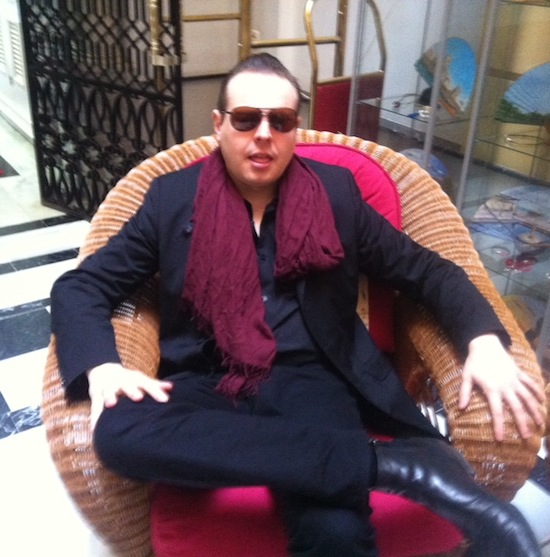
When we get to Seville we’re driven to a restaurant bar that serves great tapas food at the invitation of Rafa. The bar is adjacent to a bullfighting ring, and matadors apparently come here to drink champagne when they’ve won. Rafa is in a good mood, though he tells Benjamin it is imperative that he remains in the venue each night in the vicinity of the merchandise stand. “You can’t disappear like you did last night,” he chastises. Even Dominique, a relatively big star in Spain, will make an appearance at the merch table each night to sign albums for fans. An artist like Dominique can expect to sell a thousand albums on tour, maybe more. Benjamin won’t make anything like that on an introductory tour; but a support act will likely sell next to nothing without being there to jog people’s memories as they make for the exit.
21.01.13
Benjamin has become obsessed with Jeanette, a Spanish singer whose heyday was the 70s and early 80s, a middling ingenue with a line in saccharine but not entirely unpleasant ballads. Every day in the car he plays ‘Corazón de Poeta’, one of her hits, as we embark on a new city. He’s on a mission to find her and make an approach for some future collaboration.
“I asked Rafa to find me Jeanette so I could write a song for her,” he reveals. “He said: ‘who the fuck is Jeanette?’”
It’s a bit like Searching For Sugar Man I suggest.
“I played a gig with Rodrigez a few years ago in Sweden. He was just in Sweden all the time, drinking. They could have found him on Facebook but it wouldn’t have made such a good film."
Benjamin has stopped being stroppy now about English people making fun of his red trousers. It’s true, I made a comment about his trousers and so did Andy, Dominique’s tour manager, the only other rosbif on the tour. Andrew Jarman is another interesting and illuminating character. He was the tour manager for The House Of Love when they got signed to Creation in the late 80s, and he recounts some of the madness from that time which he says “all got too much”. Having bought a property on Stoke Newington’s now uber trendy Church Street for next to nothing back when it was a dump, he fled England (and some dodgy gangsters who’d moved into his basement) after selling the place for a substantial profit. His “extremely obscure and pretentious electro band” (his words) A Popular History of Signs took him to Spain in the first place, and he finally settled in Seville with his partner Mapi in 1991 where he’s been ever since. You have to hand it to him, he’s got a nice life.
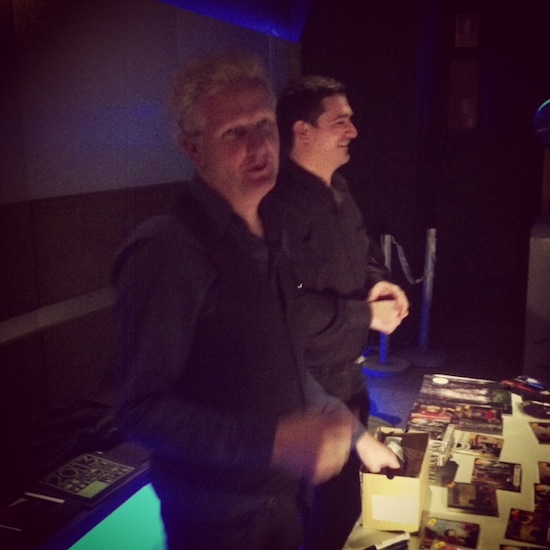
I wonder how the Spanish music scene has changed in the time Andy has lived there.
“The Spanish scene was very different to the Brit one in that it was extremely heavily publicly subsidised,” he points out. “As a reaction to the death of Franco in 1975 the country became quite left wing for a while, and amongst other things local councils all over the country were paying quite good money for gigs. Bands as modest as my group Southern Arts Society could sometimes get €1,500 for a gig and almost every village had its yearly festival, paying quite ludicrous sums of money. A band on the A list (usually an old 80s one) that could attract maybe 200 people to a normal venue would sometimes get €8 to €10,000 for festivals. Just by doing 20 or so a year they were making a very reasonable living.
“With the crisis that has all gone overnight. Town halls which can’t pay their staff certainly aren’t going to cough up huge sums of money for some ephemeral event. So the game has changed: Festivals like Primavera and Benicassim get all their funding from sponsorship, mainly with beer companies.”
The show in Cadiz is a marked improvement. Benjamin sells a fair amount of records and someone asks me to sign his album puzzlingly. The last time that happened I was standing chatting to the bass player of Mercury Rev at the Guildford Festival. I’m not sure who they thought I was but this time, like that time, I sign with an enigmatic ‘J’.
22.01.13
Today is my birthday and it’s raining. We will drive to Granada where Benjamin will do a headline show in a club called Planta Baja. One of the roadies asks Benjamin if he’ll buy a largish quantity of cocaine when we get to Granada and then bring it back to Seville the next day. Benjamin finds the prospect frightfully exciting, though Sabino the driver puts the kibosh on it. He smiles sweetly and says ‘No’, emphatically.
“That’s not very rock & roll”, says the disappointed would be recipient.
But that’s the thing, we’re not rock & roll. We are men in our mid to late thirties driving around Spain listening to Jeanette and playing chansons of an evening. We would throw a TV out of the hotel window but who’s got the money to pay for it? And besides, it would certainly inconvenience the hotel and the people staying the following night.
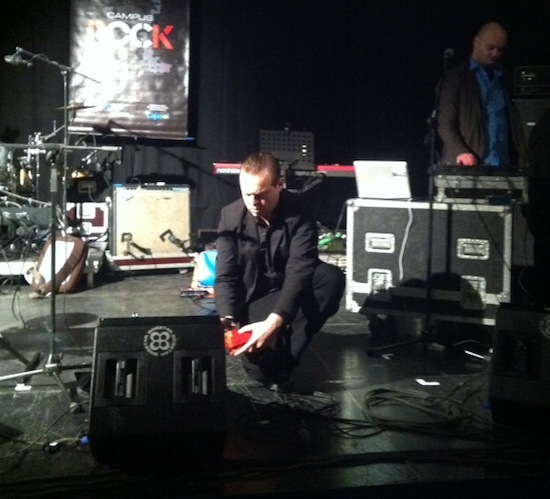
“I’m not a fucking go-fast,” says Sabino. In French a ‘go-fast’ is someone who drives drugs around at high speed, apparently.
The Granada show is a triumph even if the weather is wretched. There are less than 30 people in the audience but most of them fall under Benjamin Schoos’ spell. He’s loquacious and funny this evening, perhaps because the people here are here to see him, even braving the inclement weather. La Chinoise is particularly on the money.
Granada is supposedly one of the most beautiful cities in Spain, though we’re forced to hide out at the hotel where Benjamin makes me watch the French ‘comedy’ Calmos on his laptop, a film about two gynaecologists who run away to the country because they’re tired of women. I have no idea whether this film is funny or not, even with Benjamin translating every line. The rain clears briefly in the morning and I go for a run, accidentally smacking into a large lady causing an airbag-like thud. Steam ejaculates from her nose and I scamper like a half-witted torero.
23.01.13
Snow covers the mountain tips as we drive back across the breathtaking Sierra Nevada to Seville. Granada was the only place it snowed in the whole of Spain yesterday (not that we saw any) but when Sabino hears word back that its minus twelve in Belgium we feel better about happenstance and where we are in it.
As January birthdays go, yesterday’s was terrific. If January were a person it would be a sadistic bouncer poking you in your face, degrading you, admonishing you for being sick in your own hair and deterring you from having any fun. Even as a prefix January will always make you think of some dreaded purgatory, slipping into a stony bed with cold, hard words like blues; detox; sale; transfer window. There is a law written somewhere that demands you serve a period of penance during the first month, and given that my birthday falls during this period every year without fail, I have never yet been able to rouse anything like a celebration worthy of my greatness. Fuck that. There are ways to cope when birthdays and Januarys collide. Take your date of birth off Facebook and leave the country. Don’t answer the phone and don’t acknowledge it as a day any different to any other, except if people buy you presents; then you should respond courteously (Sabino buys me a bright blue Jim Morrison t-shirt and Benjamin an album by Jeanette). Remember, it’s only the people who really care who will remember, which matters so much more than dicks you haven’t seen in 20 years invading your wall with empty salutations and clanging emoticons.
We arrive at the Teatro Central in Seville and its a massive modern venue. Before soundcheck Benjamin, Sabino and I are driven away to a studio at the local university where some Spanish guys want to film a session for an internet magazine. Much of the music for this tour is played through sequencers, though someone hands Sabino a Spanish guitar and he and Benjamin gamely play through a number unrehearsed. Benjamin is flinging himself around the sofa performing and ends the song on the floor lying on his back before springing back to life again. I have no idea where he summons the energy from. I retreat early tonight, knackered. I’d forgotten how driving around from city to city takes it out of you.
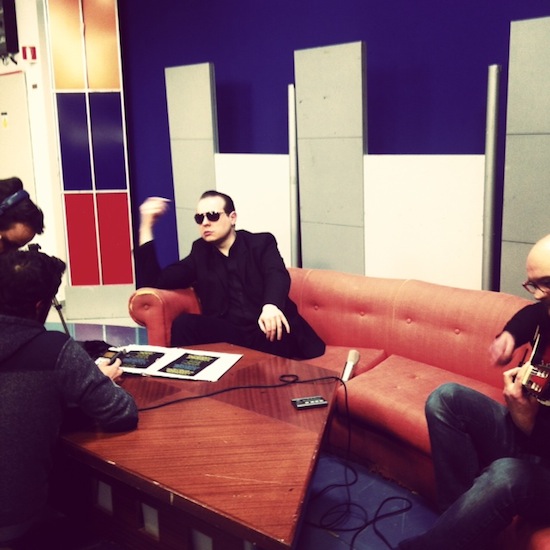
24.01.13
Tonight is the last night of the tour, and Benjamin and Dominique play at the Sala Arena, a large underground cavern tucked under the tallest building in Madrid. Both artists play their best shows tonight. Benjamin is sweating and on his knees in the crowd, a curl from his usually slicked back hair falling forward so he looks like a Belgian Bill Haley, and Dominique putting in a tour de force to bring the curtain down. The two camps feel like one now and we’re collectively elated and relieved and exhausted. We wander Madrid in search of somewhere for a celebratory drink and it occurs to me there are a lot of plastic bulls for sale in the daytime and prostitutes when night falls.
The success of this tour with French speaking artists has got me thinking about the indigenous music scene, which by all accounts has become severely depleted. Andy Jarman says local bands aren’t equipped to deal with not being funded, like in the UK.
“Those €1,500 gigs have almost completely disappeared, so bands have to slog around the country for door money like in Britain. The trouble is, Spanish musicians aren’t used to that model so it has decimated the music scene.”
“There are lots of Spanish people making music and forming new bands,” says Rafa, “but later in a year or two, they realise how difficult it is to go forward. This should be one of the most competitive markets in the world, but Spanish people just don’t have the money in their pockets anymore. You can’t go to eight to ten live shows a month anymore. Maybe you have money for one, two, three shows.”
To make matters worse, the government increased VAT on concert tickets from 8% to 21% last September.
“We also need to pay 10% of publishing rights for each show,” says Rafa. “So when you’ve sold a ticket for €10, then you only receive €6.9. And with this you have to pay the artist’s fee, the rent of the club, the promotion of the event, the personnel, the backline, the PA… it’s unbelievable! Culture is not a luxury, except in Spain. It’s killing the live music business. We, the music industry in Spain, have even harder times in front of us.”
Growing a fanbase in Spain will be something for Benjamin to consider applying himself to in the future though the conditions are unlikely to be as favourable as they’ve been for Dominique the last 17 years; at least for the time being anyway. Meanwhile Benjamin’s next stop is to take China Man vs China Girl to the People’s Republic of China itself, having been invited to perform a series of concerts in Shanghai. Bonne chance Monsieur Schoos.
